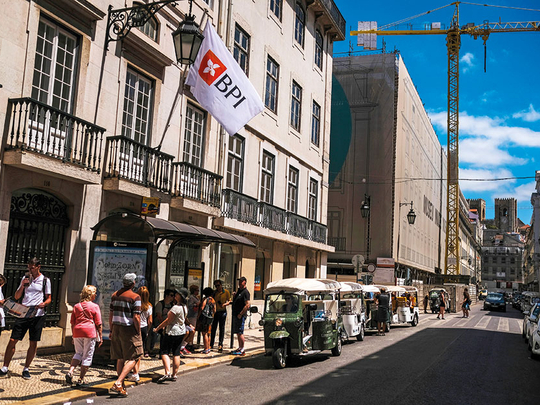
PORTUGAL: From the fifth floor of the Banco BPI building in downtown Lisbon, chief executive officer Pablo Forero can get a clear view of the transformation taking place in the Portuguese capital.
Outside the lemon-coloured edifice, hundreds of tourists make their way along the cobblestone pavements to the riverfront Praca do Comercio, once a hub for traders arriving on ships from all over the world. New hotels, short-term rental apartments and stores that cater to a growing number of tourists have been mushrooming in the area over the last few years.
BPI sold the 200-year-old set of buildings that occupy a whole block last month for more than €66 million ($77 million or Dh282.59 million) to a German fund, joining the ranks of trading houses and goldsmiths that have been moving out of the Portuguese capital’s famed Baixa quarter. Over the years, some relocated uptown or to office parks on the city’s outskirts. Those that kept their buildings in the downtown area are now taking advantage of a real estate boom that has sent property prices to record highs.
“Why did we sell?” Forero said to reporters at a press conference on July 24 on the top floor of the BPI building. “We decided to take advantage of a very interesting moment in the property market.”
Not far away, Banco Comercial Portugues, Portugal’s biggest listed bank, and state-owned Caixa Geral de Depositos are also selling their landmark properties on Rua do Ouro street, which literally means “gold street.” Both lenders provided details about the planned sales in July.
While cutting costs is a key driver for the sales, it’s no coincidence that three of the country’s biggest banks decided to sell some of their most prized property assets at the same time. Investment in Portuguese real estate is forecast to rise to a record €3.5 billion in 2018 from €2.1 billion last year, according to Cushman & Wakefield. Foreigners accounted for 67 per cent of that investment in 2017. Portugal recorded the third-highest increase in home prices in the European Union last year, according to Eurostat.
“The truth is that demand has never been stronger,” said Ana Gomes, a director at Cushman & Wakefield in Lisbon involved in the sale of the Caixa Geral building. “It’s a seller’s market. Anything is possible.”
The revival in Lisbon’s downtown property market began after the previous government eased long-held rent controls in 2011 and started offering residence permits and tax breaks to foreigners. At the same time, a tourism boom fuelled more demand for new hotels and rental apartments. Average home prices in the historic centre increased 60 per cent over the last five years, according to Cushman & Wakefield.
With the real estate stock available in the city centre shrinking, investors are likely to continue to pay top dollar for the last available units in the Baixa area.
“This has nothing to do with the market peaking in Lisbon,” said Jose Cardoso Botelho, head of Vanguard Properties, a developer that recently sold a penthouse in the city for a record €22,000 per square metre. “Lisbon is attracting a new kind of investor that wants to buy something special, regardless of the price.”
The BPI building, for example, sold for more than €5,000 a square metre. That’s more than double the price investors would pay for a property in the same area three years ago, according to Square Asset Management, a real estate investment firm in Lisbon.
“It’s crazy,” said Pedro Coelho, the CEO of Square, which has about €1 billion in real estate investments. “There’s no doubt in my mind that this is a good moment to sell.”
As bankers and other property owners rub their hands with joy, some residents in the city centre are throwing their arms up in despair. They complain of being priced out of their neighbourhood homes and of noise from tourists and construction work as they try to go about their daily lives.
“They want to buy everything we have,” Helena Jacinto, a 76-year-old pensioner, said as she walked past Pastelaria Suica, a traditional pastry shop in the downtown Rossio square that’s expected to shut down in August after the entire block was sold to a foreign investor. “In a few years, most of the landmarks that made this place unique will be gone.”
Even those on the far left of the political spectrum have been lured by the surging property market. Left Bloc party member Ricardo Robles, who campaigned against real estate speculation in Lisbon, resigned as a city councillor on Monday after mounting criticism about a deal involving a building he bought in 2014 for €347,000 and later valued by a broker at €5.7 million after renovation work.
The Bank of Portugal said on June 6 that the rise in residential real estate prices has been “particularly strong,” adding that in the second half of 2017 there were some signs, even if very limited, of prices being overvalued. For some officials at Portuguese banks, talk about a possible bubble makes no sense.
“It’s true that there are certain areas where demand is very hot,” Banco Comercial CEO Miguel Maya said on July 26. “But I don’t think at all that there is a bubble in the property market.”











